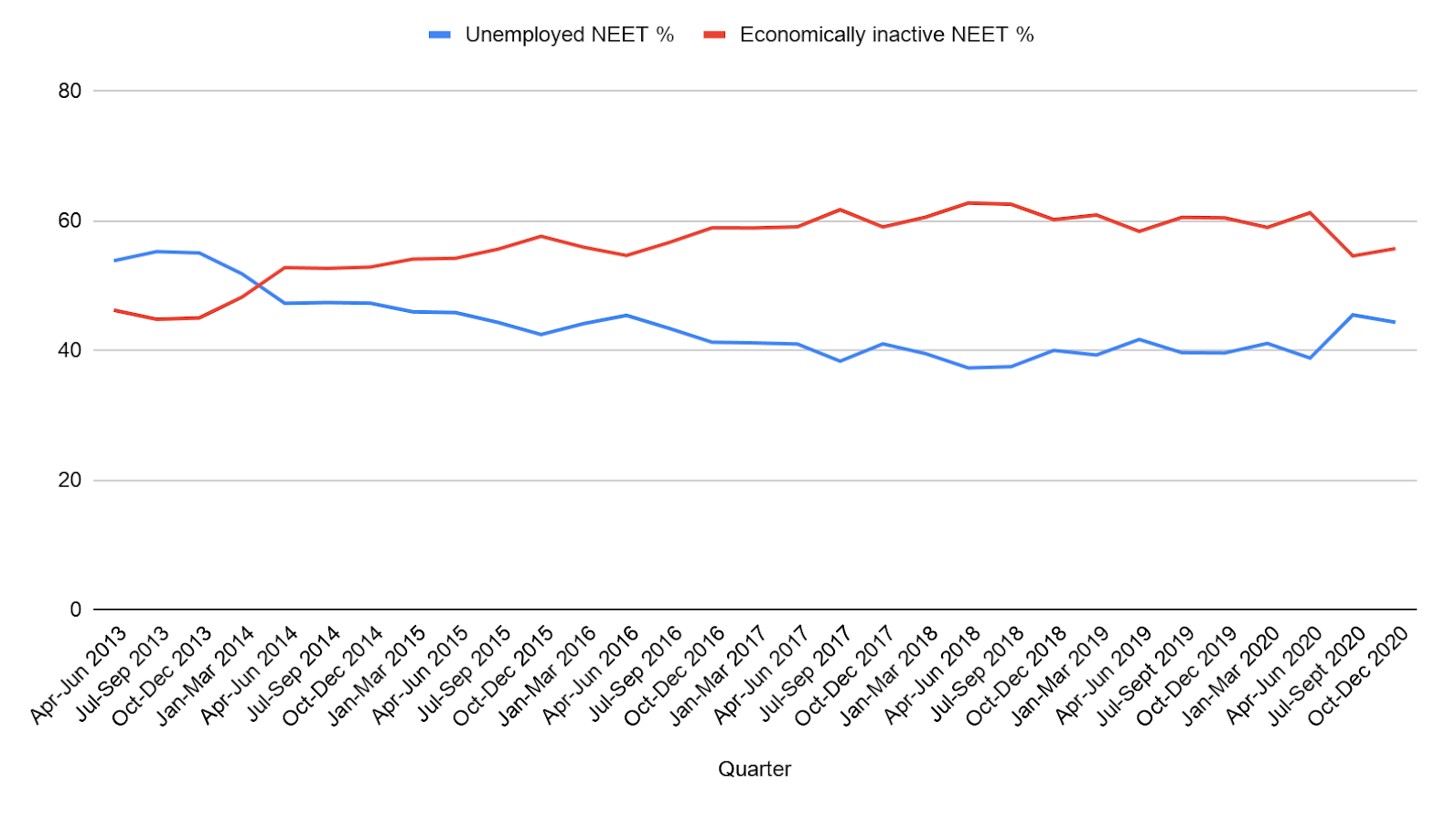The Office for National Statistics (ONS) have released the latest data on young people not in employment, education or training (NEET), covering the quarter from October – December 2020.
This dataset includes those who are in any form of part-time education or training and so the number of young people who are NEET is slightly lower than estimates from the monthly ONS Labour Market Overview which only includes those in full-time education or training.
The overall number of young people who are NEET has risen in the last quarter, with an increase in unemployment and an even larger increase in economic activity. The quarterly increase of NEET young people was the largest since July to September 2011 and was almost entirely driven by economically inactive men.
Unemployment means a person is looking for work and is able to start work. Economically inactive means a person is neither looking for work or is unable to start work.
The headline statistics
- 797,000 young people are NEET; this has increased by 39,000 on the previous quarter and 34,000 on the previous year. The quarterly increase of 39,000 was the largest since July to September 2011 and was almost entirely driven by economically inactive men.
- The percentage of all young people who are NEET is estimated at 11.6%; the proportion was up by 0.6 ppts on the previous quarter and up by 0.6 ppts on the previous year.
- 353,000 young people are classed as unemployed, up by 9,000 on the previous quarter and 51,000 on the previous year. This translates to 44.3% unemployed NEET young people.
- 444,000 young people are classed as economically inactive, up by 31,000 on the previous quarter and down by 17,000 on the previous year. This translates to 55.7% economically inactive NEET young people.
Insights: gender and age
- NEET gender split: 460,000 are men and 336,000 are women.
- 13.2% of 16-24 year old men are NEET, which was the highest since October to December 2013, and for 16-24 year old women the proportion was at 10.0%.
- 52,102 16-17 year olds are NEET, up 6,000 on the previous quarter and down 12,000 on the previous year. This translates to 3.6% of all 16-17 year olds being classed as NEET.
- 744,424 of 18-24 year olds are NEET, up 33,000 on the previous quarter and up 45,000 on the previous year. This translates to 13.6% of all 18-24 year olds being classed as NEET.
Percentage of NEET 16-24 year olds by unemployment and economic inactivity
This graph shows the percentage breakdown of NEET young people who are unemployed and economically inactive between April-June 2013 and October-December 2020. Since 2013 the economic activity has slowly increased whilst unemployment has jumped up in the previous year.
Our Commentary
The statistics released today by the ONS show the largest quarterly increase in the number of NEET young people since 2011, the year NEET levels began to peak following the economic crash of 2008. This is concerning as unemployment has been rising steadily whilst employment is falling steadily; this slow change can lead to long-term unemployment as seen in previous recessions.
Recent research by the Institute for Employment Studies and Youth Futures Foundation tells us that 200,000 young people have now been unemployed for 6 months or more; we could be seeing the start of a long-term unemployment crisis amongst this age group.
There are also swaths of research over the course of the previous year that tells us young people are the most impacted cohort by Covid-19 in terms of employment and education. Young people were more likely to work in shut down sectors, more likely to be furloughed, and are most subject to the ‘last in first out’ redundancy trend. Three fifths of the fall in employment since the beginning of the pandemic is amongst under 25; the unemployment rate of 16-24 year olds has soared to 14.4%.
The Plan for Jobs and other initiatives introduced by the Government over the last year will not go far enough to protect young people from decreased labour market participation and from the impacts on their education. Young people falling out of employment are struggling to access new opportunities, Kickstart placements and Traineeships are being delayed, apprenticeship starts for young people are down drastically over the previous year. In addition to this, the hospitality, retail and tourism sectors (where young people are most likely to work) will not be fully open until the summer.
The Budget yesterday announced the extension of the Coronavirus Job Retention Scheme which should save jobs and stop unemployment rising above 10% as originally feared by the Bank of England. Yet it seems the Government has missed an opportunity to give young people the protection they need in the coming months and years. The granular level support for those from ethnic minority backgrounds, those who have disabilities (and other protected characteristics) and those who are most disadvantaged is not comprehensive enough. We see that disabled young people’s participation in the labour market is falling, whilst black young people are 4 times more likely to lose their job and Asian young people are 3 times more likely to lose their job.
Knowing the impact of the pandemic on young people is big, we have built a wide range of digital resources for all young people, co-designed with young people. The Careers Hub provides young people with information on sectors, jobs and career inspiration. We have launched our Opportunity Finder that links young people with youth friendly employers. We have also launched our Young Professional: Journey to Work Programme that helps young people learn about themselves and identify and build key skills required in the workplace. Finally we have launched our Virtual Work Experience, supported by youth friendly employer McDonalds.
We continue to work in close partnership with Government departments, the Youth Employment Group, our APPG for Youth Employment and employers to ensure no young person is left behind.













